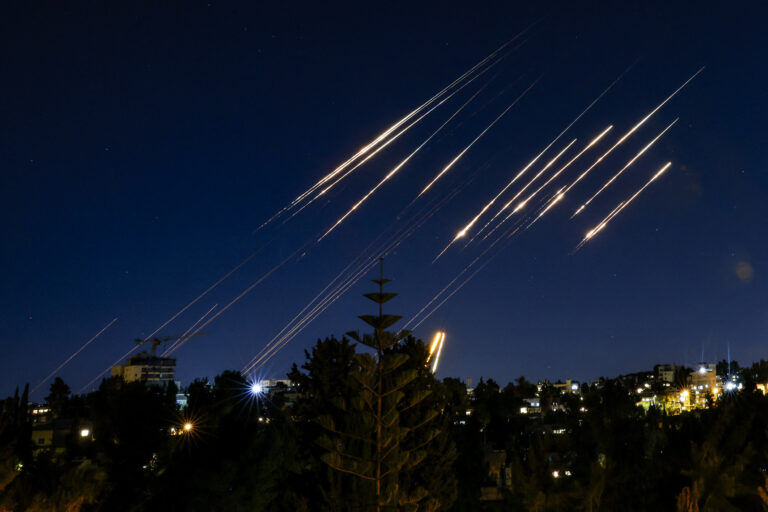The U.S. Embassy in Jerusalem will be closed from Wednesday through Friday as President Donald Trump weighs military attacks on Iran in support of Israel.
The embassy said in a press release, “As a result of the current security situation and ongoing conflict between Israel and Iran, the U.S. Embassy has directed that all U.S. government employees and their family members continue to shelter in place in and near their residences until further notice.
The release continued, “Given the security situation and in compliance with Israel Home Front Command guidance, the U.S. Embassy in Jerusalem will be closed tomorrow (Wednesday, June 18) through Friday (June 20). This includes the Consular Sections in Jerusalem and Tel Aviv. There will be no passport (emergency or regular) or Consular Report of Birth Abroad services.”

AFP/Getty Images
Why It Matters
Tensions surged across the region on the fifth day of Israel’s air campaign targeting Iran’s military and nuclear infrastructure, prompting waves of residents to flee Tehran.
What To Know
For the first time, the U.N. nuclear watchdog confirmed that Israeli strikes damaged not only above-ground structures but also the main underground centrifuge facility at Iran’s Natanz uranium-enrichment site. Israel has defended the operation as essential to stopping Iran from advancing toward a nuclear weapon, with at least 224 people reported killed in Iran. In response, Iran has fired around 400 missiles and launched hundreds of drones at Israel, where 24 fatalities have been reported so far.
Haidar is a title commonly associated with Ali, whom Shia Muslims regard as the first Imam and the rightful successor to the Prophet Mohammed.
U.S. officials insisted as of Tuesday that the American military has not taken any offensive actions against Iran, only defensive strikes to take out incoming Iranian missiles to protect Israel.
Trump faces a pivotal moment as Israel’s five-day campaign of missile strikes against Iran has reportedly inflicted significant damage. Israeli officials believe they are close to delivering a decisive blow to Iran’s nuclear infrastructure — particularly if the U.S. provides advanced support, such as bunker-busting munitions or direct military assistance.
The U.S. military has increased its air power in the Middle East by deploying additional fighter jets and extending current warplane missions as the conflict between Israel and Iran intensifies, three U.S. officials told Reuters.
In a social media post, Trump warned that “we now have complete and total control of the skies over Iran.”
One official confirmed the move includes the deployment of advanced aircraft such as F-16s, F-22s and F-35s.
The Air Force’s B-2 Spirit stealth bomber is the only aircraft capable of carrying the 30,000-pound GBU-57 Massive Ordnance Penetrator, commonly known as the bunker buster. This formidable weapon relies on its immense weight and kinetic energy to penetrate deeply buried targets before detonating.
Currently, no B-2 bombers are stationed in the Middle East, though B-52 bombers operating from Diego Garcia can deliver smaller precision munitions. If deployed, B-2s would need to fly a 30-hour round trip from Whiteman Air Force Base in Missouri, requiring multiple in-flight refuelings.
Meanwhile, the president and Israel’s Prime Minister Benjamin Netanyahu spoke on the phone Tuesday, shortly after the president’s Situation Room briefing on Iran, a White House official told Associated Press.
The official did not offer details about their call.
During his security briefing on Tuesday afternoon, Trump discussed a range of options for dealing with Iran, including a U.S. strike on the country, several administration officials told NBC News.
Several military leaders were spotted leaving the White House after the briefing, along with Special Middle East envoy Steve Witkoff and Chairman of the Joint Chiefs of Staff Dan Caine.
What People Are Saying
When asked on CNN Tuesday night about his knowledge of any U.S. plans to join Israel’s offensive against Iran, ambassador Yechiel Leiter said, “Prime Minister Netanyahu and President Trump have had a conversation for five months. He was the first foreign dignitary to visit the White House after he returned to office.
He continued, “As of now, this is a blue and white operation and should the President of the United States turn it into a red, white and blue operation, remains to be seen.”
“This is a war to end wars not to start endless wars,” Leiter added. “We are going to prosecute this war whether the Ayatollah [Khamenei] survives or not,” as he discussed Trump saying earlier on Tuesday that the U.S. knows where Khamenei he is hiding amid the ongoing Israeli strikes.
Gen. Abdul Rahim Mousavi, the commander in chief of Iran’s army, said in a video, “The operations carried out so far have been solely for the purpose of warning and deterrence. The punishment operation will be carried out soon.”
In a post on Truth Social earlier on Tuesday, President Trump said the U.S. knows where Iran’s Supreme Leader Ayatollah Ali Khamenei is hiding but doesn’t want him killed “for now.” Trump also urged Iran’s “UNCONDITIONAL SURRENDER” as the Israel-Iran conflict escalates.
Iran’s Supreme Leader Ayatollah Ali Khamenei declared in a post on X, “In the name of the noble Haidar, the battle begins.”
What Happens Next
The U.S. has taken a defensive posture in the conflict so far, intercepting some of the missiles Iran has fired toward Israel. But Israeli officials and some hawkish Republicans have called for the U.S. to play a bigger role, including by giving Israel bunker-busting munitions.
Update: 6/17/25, 7:39 p.m. ET: This article was updated with new information and remarks.
Update: 6/17/25, 7:58 p.m. ET: This article was updated with new information.
Update: 6/17/25, 8:20 p.m. ET: This article was updated with new information and remarks.
Update: 6/17/25, 8:53 p.m. ET: This article was updated with new information and remarks.
Update: 6/17/25, 9:12 p.m. ET: This article was updated with new information.
This article includes reporting by The Associated Press.


